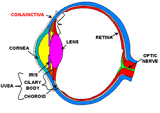Allergic Conjunctivitis (AC)

Allergic conjunctivitis is inflammation of the conjunctiva, which is the membrane covering the white part of the eye, due to allergy. Although allergens differ among patients, the most common cause is hay fever. Symptoms consist of redness, edema of the conjunctiva, itching, and increased lacrimation. If this is combined with rhinitis, the condition is termed allergic rhinoconjunctivitis. Treatment of allergic conjunctivitis is by avoiding the allergen and treatment with antihistamines, either topical (in the form of eye drops), or systemic (in the form of tablets). Antihistamines, medications that stabilize mast cells, and non-steroidal anti-inflammatory drugs (NSAIDs) are generally safe and usually effective.
Organism species: Mus musculus (Mouse)
- Disease model DSI647Mu01 Mouse Model for Allergic Conjunctivitis (AC) In Stock
- Disease model DSI647Mu02 Mouse Model for Allergic Conjunctivitis (AC) In Stock
- Customized Service n/a Tissue of Allergic Conjunctivitis (AC) (If Necessary) Tissue Customized Service Offer
- Customized Service n/a Serums of Allergic Conjunctivitis (AC) (If Necessary) Serums Customized Service Offer
Organism species: Rattus norvegicus (Rat)
- Disease model DSI647Ra01 Rat Model for Allergic Conjunctivitis (AC) In Stock
- Disease model DSI647Ra02 Rat Model for Allergic Conjunctivitis (AC) In Stock
- Customized Service n/a Tissue of Allergic Conjunctivitis (AC) (If Necessary) Tissue Customized Service Offer
- Customized Service n/a Serums of Allergic Conjunctivitis (AC) (If Necessary) Serums Customized Service Offer
Organism species: Cavia (Guinea pig )
- Disease model DSI647Gu01 Cavia Model for Allergic Conjunctivitis (AC) In Stock
- Disease model DSI647Gu02 Cavia Model for Allergic Conjunctivitis (AC) In Stock
- Customized Service n/a Tissue of Allergic Conjunctivitis (AC) (If Necessary) Tissue Customized Service Offer
- Customized Service n/a Serums of Allergic Conjunctivitis (AC) (If Necessary) Serums Customized Service Offer
Organism species: Oryctolagus cuniculus (Rabbit)
- Disease model DSI647Rb01 Rabbit Model for Allergic Conjunctivitis (AC) In Stock
- Disease model DSI647Rb02 Rabbit Model for Allergic Conjunctivitis (AC) In Stock
- Customized Service n/a Tissue of Allergic Conjunctivitis (AC) (If Necessary) Tissue Customized Service Offer
- Customized Service n/a Serums of Allergic Conjunctivitis (AC) (If Necessary) Serums Customized Service Offer
Organism species: Canis familiaris; Canine (Dog)
- Disease model DSI647Ca01 Canine Model for Allergic Conjunctivitis (AC) In Stock
- Disease model DSI647Ca02 Canine Model for Allergic Conjunctivitis (AC) In Stock
- Customized Service n/a Tissue of Allergic Conjunctivitis (AC) (If Necessary) Tissue Customized Service Offer
- Customized Service n/a Serums of Allergic Conjunctivitis (AC) (If Necessary) Serums Customized Service Offer


